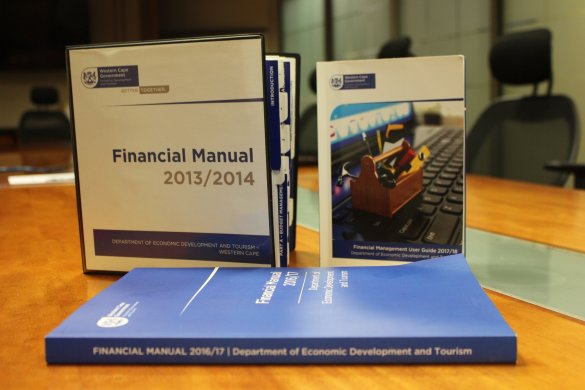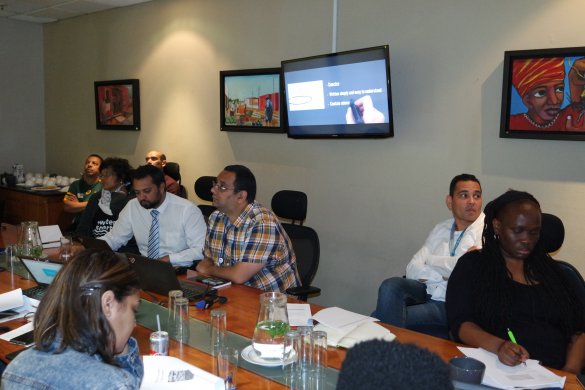Cutting Red Tape begins at “home” – DEDAT Financial Management
This article kicks off a series that the Red Tape Reduction Unit will be undertaking to showcase what WCG Departments are doing in reducing red tape within their organisations, and therefore making it easier for officials to interact with citizens. It is therefore fitting that we look within our Department, specifically in Financial Management, for examples of good practice.
Good governance and strong accountability are essential to the administration of government. It provides how we meet our responsibilities as public servants. They are crucial to the integrity of government as an institution. However, as officials we also have a duty to be efficient and effective in the way we manage ourselves and our areas of responsibility. We approached our finance team for their views on how they approach the regulatory and administrative processes which structure decision-making, while ensuring that risk-averse, inefficient and time-wasting behaviour is mitigated.
“It’s all about continuous improvement”
And as such the financial management team has adopted a LEAN approach to tackling their internal service offerings to DEDAT officials (LEAN will be discussed in a future article). This approach requires mechanisms for continuously identifying where inefficiencies (and “waste”) potentially arise and tackling them methodically. The finance helpdesk is a platform familiar to every official in DEDAT. More than a direct mechanism for ensuring effective management of any enquiries, it serves as a radar providing intelligence on potential process bottlenecks and identifying areas of uncertainty in relation to any specific financial prescripts or practices. These identified areas are work-shopped by a transversal team within finance and improvements recommended and piloted, and then “we keep what works”. Standard Operating Plans are then reviewed, new standards incorporated and more importantly communicated extensively. This has resulted in multiple “simplifications”, from streamlining formal submissions into easy-to-complete forms, to amending delegations (minimising the number of required sign-offs) thereby expediting the channeling of necessary approvals, resulting in days being cut from original operating timeframes.
“Communication is key”
Continuous improvement also requires constant communication with DEDAT officials who are critical partners in ensuring corporate governance. Here the team has developed an internal communications strategy as its roadmap for ensuring that important information is effectively channelled to officials. Important prescripts and notices are reviewed, the essential elements are extracted to ensure that content is readily understood by staff. These are then uploaded to an online document storage facility (MyContent) to ensure that information is readily available and accessible. More importantly, a lot of emphasis has been placed on not only providing information but ensuring that staff are capacitated on the relevant content.
This required a creative approach to ensure that staff were engaging with the content in a way familiar to them. Annual financial management training has always been a staple within the Department, but reviews, feedback and Frequently Asked Questions (FAQs) indicated that a “fresher” approach was required. In response to this, a series of animated training videos were developed to condense what could be considered complex jargon into “bite-sized understandable chunks”. In the words of an official who recently underwent the training: “This training has meant that I spend less time grasping complex training content as I am able to learn the same material in a shortened time and at the same time being able to actually visualise what the training content is all about.”
This is also the team’s approach to ensure that important concepts such as Fraud Prevention are entrenched into the Department’s culture. For this important topic the team literally “Flipped the Script”. This was the theme for Department’s Annual Fraud Prevention Day, where officials were shown how to identify and more importantly act, when potentially facing the situation. This was accomplished through the use of theatre style demonstrations as well as thought provoking “real life” examples staff may not have thought about, starting a discussion on the topic.
The Department’s financial management approach can be summarised in the words of the Chief Financial Officer, Mymoena Abrahams: “The public-sector environment promotes good governance and strong accountability within its financial administration processes. However as financial management officials we have a responsibility to be effective and efficient in the way we deliver our services to our clients. I believe that the way we structure our administrative and regulatory processes should not lead to inefficiencies and time wasting. At the same time educating and training our clients or the line functions in financial management processes will enhance governance and improve service delivery. It is therefore important that we constantly find innovative way to educate and train our clients.”



